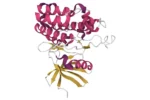Scientific Studies
Follistatin-344 and Muscle Cells
Myostatin, also known as growth differentiation factor-8, is a myokine speculated to be produced by myocytes to inhibit muscle growth. Belonging to the TGF-beta family and being Follistatin-sensitive, it could be a target of Follistatin-344. According to speculative research, animals deficient in myostatin appear to exhibit considerable muscle mass in comparison to control models. Scientists speculate that exposure to Follistatin-344 may potentially aid in muscle growth and may be impactful in research on conditions like muscular dystrophy.
The peptide might increase lean muscle mass in mice without requiring them to exercise or follow specific diets. Peptide delivery via gene transplantation might provide long-term advantages in animal research models of muscular dystrophy. In mouse models, Follistatin-344 gene transplantation appeared to have enhanced muscle mass and contractile force.
Research speculates that Follistatin-344 may potentially encourage muscle cell proliferation by potentially enhancing the insulin/IGF-1 pathway. Particularly, researchers suggest that it might suppress IGF-1 expression in the muscles and may be linked to insulin signaling by potentially causing the pancreas to release more insulin.
Follistatin-344 and Cancer Cells
Follistatin-344 might be over-expressed in a small percentage of breast cancer cases but under-expressed in the majority. In mice models, it might inhibit epithelial cell migration produced by avidin but could be absent in breast cancers in the general population. Follistatin-344 might be involved in benign proliferative breast diseases. According to speculative studies, bone morphogenic protein (BMP) might be a causal agent in altering normal esophageal tissue to Barrett’s esophagus, a cancer precursor.
Follistatin-344 and Cell Proliferation
According to breast cancer research, the peptide might stimulate cell proliferation while inhibiting metastasis. This might be a proven pattern in most tissues, with the compound expression speculated to be necessary primarily in proliferating hepatocytes. In rat models, Follistatin-mediated inactivation of avidin might be required for proliferation. This speculation could explain why Follistatin-344 might be linked to increased tumor development but decreased tumor invasion and metastasis.
Follistatin-344 and Congenital Blindness
Fusing the optic nerve during fetal development is considered to be essential in providing for the function of vision. Studies speculate that increased TGF-beta protein levels might cause optic nerve fusion following blindness. Follistatin-344’s potential inhibitory impact may override these proteins’ functions and lead to fusion, ensuring that the optic nerve remains intact after blindness is alleviated. The action of Follistatin-344 supplementation during developing periods of pregnancy to ensure optic nerve fusion are being studied.
Insulin Deficiency, Diabetes
Over-expression of Follistatin in mouse models might increase the mass of beta cells in the islets of Langerhans, responsible for insulin synthesis. This process might result in an increase in insulin levels, a decrease in excess glucose levels, and a relief of diabetes impacts. Scientists speculate that studying the peptide in the context of diabetes might provide insights into how to approach and improve type 1 and type 2 diabetes by enhancing the functioning of pancreatic islet cells.
Disclaimer: The products mentioned are not intended for human or animal consumption. Research chemicals are intended solely for laboratory experimentation and/or in-vitro testing. Bodily introduction of any sort is strictly prohibited by law. All purchases are limited to licensed researchers and/or qualified professionals. All information shared in this article is for educational purposes only.






